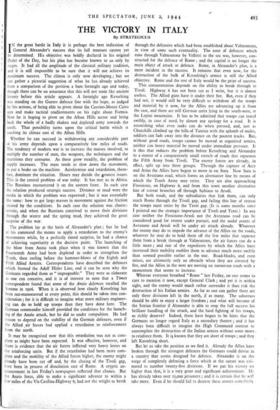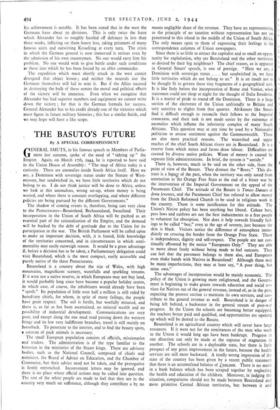THE VICTORY IN ITALY
By STRATEGICUS N the great battle in Italy it is perhaps the best indication of I General Alexander's success that its full measure cannot yet be determined. His objective was boldly declared in his original Order of the Day, but his plan has become known to us only by stages. It had all the amplitude of the classical military tradition, and it is still impossible to be sure that it will not achieve its maximum success. The climax is only now developing ; but we can gather a pictorial suggestion of what he has already achieved from a comparison of the position a bare fortnight ago and today,
though there can be no assurance that this will not seem like ancient history before this article appears. A fortnight ago Kesselring was standing on the Gustav defence line with the hope, as judged by his actions, of being able to pivot about the Cassino-Monte Cairo area and make tactical readjustments on his right about Formia.
Now he is hoping to pivot on the Alban Hills sector and bring back the whole of a badly shaken and depleted army towards the north. That possibility turns upon the critical battle which is reaching its climax east of the Alban Hills.
Whether he can succeed in withdrawing any considerable part of his army depends upon a comparatively few miles of roads. The tendency of modem war is to increase the masses involved, to multiply the number of men, the weapons, the techniques and the munitions they consume. As these grow steadily, the problem of supply increases. The mass tends to slow down the movement, to put a brake on the machine. Acceleration and retardation, there- fore, dominate the situation. Hours may decide the greatest issues. This is the central problem of war today. It has met us in Africa. The Russians encountered it on the eastern front. In each case the solution produced strategic success. Distance or mud were the media in which the problem was expressed ; but it was essentially the same: how to get large masses in movement against the friction created by the conditions. In each case the solution was charac- teristic, and when the Russians contrived to move their divisions through the winter and the spring mud, they achieved the great surprise of the war.
The problem lay at the basis of Alexander's plan ; but he had at his command the means to apply a retardation to the enemy's movements while, by a perfectly timed surprise, he had a chance of achieving superiority at the decisive point. The launching of the blow from Anzio took place when it was known that the Fourteenth Army had been depleted in order to strengthen the Tenth, then reeling before the hammer-blows of the Eighth and Fifth Allied Armies. Correspondents have described the defences which formed the Adolf Hitler Line, and it can be seen why the Germans regarded them as " impregnable." They were as elaborate as one can conceive, and it is of interest to note that a Times correspondent found that some of the Anzio defences recalled the Somme in 1916. When it is observed how clearly Kesselring has been out-manoeuvred at every point, this should be taken into con- sideration ; for it is difficult to imagine what more military engineer- ing can do to hold up troops than they have done here. The German commander himself provided the conditions for the launch- ing of the Anzio attack, but he did so under compulsion. He had reason to depend on the stability of the German defences, even if The Allied air forces had applied a retardation to reinforcement from the north.
It may be recognised now that this retardation was not as com- plete as might have been expected. It was effective, however, and there is evidence that the air forces inflicted very heavy losses on the reinforcing units. But if the retardation had been more com- plete and the mobility of the Allied forces higher, the enemy might already have been cut off and, by the closing of the Tivoli gap, have been in process of dissolution east of Rome. A cryptic an- nouncement in last Friday's newspapers reflected that chance. But the Anzio force, able to make a significant advance to within a few miles of the Via Casilina-Highway 6, had not the weight to break
through the defensive which had been established about Valmontone, in view of some such eventuality. The zone of defences which runs through Valmontone by Velletri to the sea was, however, con- structed for the defence of Rome ; and the capital is no longer the main object of attack or defence. Rome, in Alexander's plan, is a mere incident in the success. It remains that even now, for the destruction of the bulk of Kesselring's armies is still the Allied objective. Rome and the rest of Italy would be the prize of success.
This consummation depends on the ability to break through to Tivoli. Highway 6 has not been cut as I write, but it is almost useless. The Allied guns have it under their fire. But, even if they had not, it would still be very difficult to withdraw all the troops and material by it now, for the Allies are advancing up it from the east, and there are still German units lying to the south-west, in the Lepini mountains. It has to be admitted that troops can travel swiftly, in case of need, by almost any apology for a road. It is astonishing what even tanks can do when pressed, and, just as Churchills climbed up the hills of Tunisia with the aplomb of mules, soldiers can fade away into the distance on the poorest tracks. But,. without good roads, troops cannot be moved as organised armies, neither can heavy material be moved under immediate pressure. It is this that reduces the problem before Kesselring and Alexander to a matter of a comparatively small stretch of roads that separates the Fifth Army from Tivoli. The enemy forces are already, in effect, split up into three groups. Through the capture of Arce and Atina the Allies have begun to move in on Sora. Now Sora is on the Avezzano road, which forms an alternative line by means of which the Tenth Army may retire. They are also approaching Frosinone, on Highway 6, and from this town another alternative line of retreat branches off through Subiaco to Arsoli.
But both roads, and the subsidiaries that link them, can only reach Rome through the Tivoli gap, and failing this line of retreat the troops must retire by the Terni gap. (It is some months since I pointed out the strategic importance of Tivoli and Terni.) In any case neither the Frosinone-Arsoli nor the Avezzano road can he considered good for retreat under pursuit, and the nodal points of Avezzano and Arsoli will be under air attack already. Whatever the enemy may do to impede the advance of the Allies on the roads, whatever he may do to hold them off the few miles that separate them from a break through at Valmontone, the air forces can do a little more ; and one of the expedients by which the Allies have increased their mobility enables them to advance much more swiftly than seemed possible earlier in the war. Road-blocks, .and even mines, are ultimately only an obstacle when they are covered by fire, and the Allies in the west are moving on numerous roads with a momentum that seems to increase.
Whereas everyone breathed "Rome " last Friday, no one seems to care to mention it now, except General Clark ; and yet it is within sight, and the, enemy would much rather surrender it than risk the destruction of his Italian armies. As far as one can gather there are only three divisions left in the north, if as many. The saboteurs should be able to enjoy a larger freedom ; and what will become of the Istrian frontier if Alexander is able to reap the full success his
brilliant handling of the attack, and the hard fighting of his troops, so richly deserve? Indeed, there have begun to be hints that the Germans no longer regard Italy as a secondary theatre ; and it has always been difficult to imagine the High Command content to contemplate the destruction of the Italian armies without some move - to reinforce them. It known that they are short of troops ; and they left Kesselring short.
But let us take the position as we find it. Already the Allies have broken through the strongest defences the Germans could devise in a country that seems designed for defence. Alexander is on the verge of completely defeating a force which at the outset was esti- mated to number twenty-five divisions. If we put his victory no higher than that, it is a very great and significant achievement. He has already taken over ts,000 prisoners ; and it is certain that he will take more. Even if he should fail to destroy these armies com:;letely his achievement is notable. It has been stated that in the west the Germans have about 5o divisions. This is only twice the force which Alexander has so roughly hustled off defences in less than three weeks, inflicting on them heavy loss, taking prisoners of many famous units and outwitting Kesselring at every turn. The crisis in which the German general is now immersed is serious even by the admission of his own countrymen. No one would envy him his problem. No one would wish to give battle under such conditions as those into which he has been forced by an abler commander.
The expedition which must shortly attack in the west cannot disregard that object lesson ; and neither the neutrals nor the Germans themselves will fail to note it. But if the Allies succeed in destroying the bulk of these armies the moral and political effects of the victory will be immense. Even when we recognise that Alexander has had superior numbers and equipment we cannot write down the victory ; for that is the German formula for success. General Alexander has to his credit already one of the victories which must figure in future military histories ; this has a similar finish, and we may hope will have a like scope.



























 Previous page
Previous page